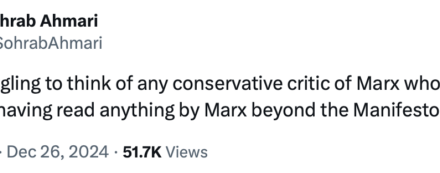We support our Publishers and Content Creators. You can view this story on their website by CLICKING HERE.
I recently came to the defense of former Attorney General Bill Barr in “They comfort me.” My post specifically addressed comments made by Lloyd Billingsley in “Thy Rod and thy staff” and pointed out Lloyd’s misleading quotation from Barr’s excellent memoir.
A reader who shall go unnamed wrote me an email in response to my defense of Barr: “When you try to discredit Trump about the integrity of the 2020 election, you never quite got around to watching your fellow Dartmouth grad’s 2000 Mules. Keeping your head in your ass about this does you no credit.” I’m sure the 496 comments on my post were equally laudatory, but I want to take this one up at the moment.
This week D’Souza has confessed error. He has posted a Statement on 2000 Mules. D’Souza screwed up. He trusted True the Vote (according to him). Viewers screwed up. They trusted D’Souza (according to me). This is the way D’Souza puts it:
As those who have seen the film or read the book know, “2000 Mules” was based on cell phone geolocation data collected and reviewed by True the Vote. An analysis of this data revealed highly suspicious patterns of certain cell phones, which were recorded in the location of ten or more dropboxes. This data was the premise of the film.
During the production of this film, as a supplement to the geolocation data, True the Vote provided my team with ballot drop box surveillance footage that had been obtained through open records requests. We were assured that the surveillance videos had been linked to geolocation cell phone data, such that each video depicted an individual who had made at least 10 visits to drop boxes. Indeed, it is clear from the interviews within the film itself that True the Vote was correlating the videos to geolocation data.
We recently learned that surveillance videos used in the film may not have actually been correlated with the geolocation data.
I know that the film and my book create the impression that these individuals were mules that had been identified as suspected ballot harvesters based on their geotracked cell phone data. While all of these individuals’ images were blurred and unrecognizable, one of the individuals has since come forward publicly and has initiated a lawsuit over the use of his blurred image in the film and the book. I owe this individual, Mark Andrews, an apology. I now understand that the surveillance videos used in the film were characterized on the basis of inaccurate information provided to me and my team. If I had known then that the videos were not linked to geolocation data, I would have clarified this and produced and edited the film differently.
We operated in good faith and in reliance on True the Vote. We continue to have confidence in their work and also in the basic message of “2000 Mules,” namely, that the 2020 election was not the “most secure election in US history”—far from it!—and that there was systematic election fraud sufficient to call the outcome into question. We also continue to have faith that True the Vote’s underlying geolocation data and analysis uncovered highly suspicious cell phone travel patterns, including a significant number of cell phone IDs that were recorded at more than ten drop box locations. While the video in the film created an incorrect inference as to Mr. Andrews, the underlying premise of the film holds true.
Indeed, the accuracy of the general proposition of “2000 Mules” was publicly confirmed recently by the disclosure of a leading Democratic organizer, who admitted to an undercover journalist that the premise of “2000 Mules” is accurate.
Again, I apologize to Mr. Andrews. I make this apology not under the terms of a settlement agreement or other duress, but because it is the right thing to do, given what we have now learned. While I do not believe Mr. Andrews was ever identified by the film or book, I am sorry for any harm he believes he and his family has suffered as a result of “2000 Mules.”
In an editorial today the Wall Street Journal expands on D’Souza’s confession of error (links omitted):
“We recently learned,” Mr. D’Souza’s apology says, “that surveillance videos used in the film may not have actually been correlated with the geolocation data.” So the movie purported to prove illegality using cellphone data . . . but then it showed videos of innocent people dropping off ballots, while presenting them as criminals?
One voter featured by the movie, a Georgia man named Mark Andrews, was cleared of wrongdoing by state investigators more than two years ago, before “2000 Mules” hit movie theaters. He has sued for defamation, and motions for summary judgment are due shortly. “I owe this individual, Mark Andrews, an apology,” Mr. D’Souza now says.
He might soon owe more than that. Six months ago the movie’s distributor, Salem Media, settled its liability “for a significant [confidential] amount,” court filings say. Mr. D’Souza claims he relied on information from True the Vote, the activist outfit he depicted as heroic. In a reply, True the Vote says it “had no editorial control over the ‘2000 Mules’ movie.” Also, Mr. Andrews “was not part of the geospatial study,” a fact that “was communicated to Mr. D’Souza’s team.”
True the Vote and Mr. D’Souza are both still standing by the “premise” of “2000 Mules.” But the shame is that so many people believed their false tale for political reasons.
I stand by every word of “They comfort me.”

 Conservative
Conservative  Search
Search Trending
Trending Current News
Current News 




